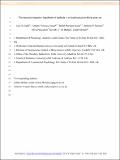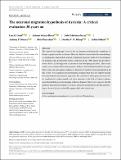Files in this item
The neuronal migration hypothesis of dyslexia : a critical evaluation 30 years on
Item metadata
| dc.contributor.author | Guidi, Luiz G. | |
| dc.contributor.author | Velayos-Baeza, Antonio | |
| dc.contributor.author | Martinez-Garay, Isabel | |
| dc.contributor.author | Monaca, Anthony P. | |
| dc.contributor.author | Paracchini, Silvia | |
| dc.contributor.author | Bishop, Dorothy V.M. | |
| dc.contributor.author | Molnár, Zoltán | |
| dc.date.accessioned | 2018-03-26T10:30:10Z | |
| dc.date.available | 2018-03-26T10:30:10Z | |
| dc.date.issued | 2018-11 | |
| dc.identifier | 252604823 | |
| dc.identifier | 5cf1fcc0-4b4a-446d-bec6-c1e534028898 | |
| dc.identifier | 000450022600009 | |
| dc.identifier | 85054489445 | |
| dc.identifier | 000450022600009 | |
| dc.identifier.citation | Guidi , L G , Velayos-Baeza , A , Martinez-Garay , I , Monaca , A P , Paracchini , S , Bishop , D V M & Molnár , Z 2018 , ' The neuronal migration hypothesis of dyslexia : a critical evaluation 30 years on ' , European Journal of Neuroscience , vol. 48 , no. 10 , pp. 3212-3233 . https://doi.org/10.7287/peerj.preprints.26637v1 , https://doi.org/10.1111/ejn.14149 | en |
| dc.identifier.issn | 0953-816X | |
| dc.identifier.uri | https://hdl.handle.net/10023/13015 | |
| dc.description | This work was supported by the Wellcome Trust (092071/Z/10/Z to A.P.M., Z.M. and A.V.-B., and 082498/Z/07/Z to D.V.M.B.); L.G.G. receive a Doctoral Training Award from the Medical Research Council; S.P. is a Royal Society University Research Fellow. | en |
| dc.description.abstract | The capacity for language is one of the key features underlying the complexity of human cognition and its evolution. However, little is known about the neurobiological mechanisms that mediate normal or impaired linguistic ability. For developmental dyslexia, early postmortem studies conducted in the 1980s linked the disorder to subtle defects in the migration of neurons in the developing neocortex. These early studies were reinforced by human genetic analyses that identified dyslexia susceptibility genes and subsequent evidence of their involvement in neuronal migration. In this review, we examine recent experimental evidence that does not support the link between dyslexia and neuronal migration. We critically evaluate gene function studies conducted in rodent models and draw attention to the lack of robust evidence from histopathological and imaging studies in humans. Our review suggests that the neuronal migration hypothesis of dyslexia should be reconsidered, and the neurobiological basis of dyslexia should be approached with a fresh start. | |
| dc.format.extent | 22 | |
| dc.format.extent | 11091324 | |
| dc.format.extent | 1239931 | |
| dc.language.iso | eng | |
| dc.relation.ispartof | European Journal of Neuroscience | en |
| dc.subject | Dyslexia | en |
| dc.subject | Gene function | en |
| dc.subject | Neuronal migration | en |
| dc.subject | Neuropathology | en |
| dc.subject | RNA interference | en |
| dc.subject | QP Physiology | en |
| dc.subject | RC0321 Neuroscience. Biological psychiatry. Neuropsychiatry | en |
| dc.subject.lcc | QP | en |
| dc.subject.lcc | RC0321 | en |
| dc.title | The neuronal migration hypothesis of dyslexia : a critical evaluation 30 years on | en |
| dc.type | Journal item | en |
| dc.contributor.institution | University of St Andrews. School of Medicine | en |
| dc.contributor.institution | University of St Andrews. Cellular Medicine Division | en |
| dc.contributor.institution | University of St Andrews. Biomedical Sciences Research Complex | en |
| dc.identifier.doi | 10.7287/peerj.preprints.26637v1 | |
| dc.description.status | Peer reviewed | en |
This item appears in the following Collection(s)
Items in the St Andrews Research Repository are protected by copyright, with all rights reserved, unless otherwise indicated.


